By Aditi Shah
NEW DELHI (Reuters) -Toyota Motor Corp and Suzuki Motor Corp on Friday said they would begin production of hybrid vehicles in India, a category that Toyota has said is currently best suited to such markets.
A Toyota plant in southern India would in August begin building a hybrid sport utility vehicle (SUV) developed by Suzuki, the companies said.
Two power trains would be available, they said: one with a mild hybrid configuration from Suzuki and the other as a strong hybrid from Toyota. In a mild hybrid, the battery only assists the piston engine, without the all-electric mode available in a strong hybrid.
Building the model is part of a broader partnership formed between the two Japanese automakers in 2017. It will be sold in India and exported to markets including Africa.
Green investors have criticised Toyota, the world's largest carmaker by sales, for slowness in moving its product line-up to all-electric, battery electric vehicles (BEVs).
But the company has argued that hybrids make more sense in markets where infrastructure is not ready for BEVs and that it needs to offer a variety of choices.
It has also said that much of the electricity in the developing world is generated by burning coal or other fossil fuel. Since BEVs rely on that generation, they are more polluting in those markets than hybrids are, it says.
Toyota last year committed to spending $60 billion by 2030 to electrify its range of vehicle models, but only half of that is for the development of fully electrics ones.
The new SUV, which has not been named, will be marketed as both a Toyota and a Suzuki, each company relying on its local affiliate to do so, they said in their joint statement.
India wants carmakers to build more electric models but the uptake for such vehicles so far has been slow, and only Tata Motors (NYSE:TTM) builds them locally.
Suzuki committed in March to investing $1.4 billion in the country to produce BEVs and batteries, but its local unit, Maruti Suzuki , India's biggest carmaker, has said it will not launch a fully electric vehicle before 2025.
Toyota is also focused on setting up a supply chain for electric vehicles in India before making BEVs there. It said in May it would invest more than $600 million to make India a global production hub for EV parts, including electric drives.

While BEVs are currently too expensive for mainstream buyers in India and other emerging economies, so are complex hybrids like the Prius, whose manufacturing cost Toyota has had trouble cutting.
This is among the reasons why Toyota partnered with Suzuki, which has championed low-cost manufacturing in India. The agreement between the two includes joint product development, lowering local sourcing costs and sharing technology.
